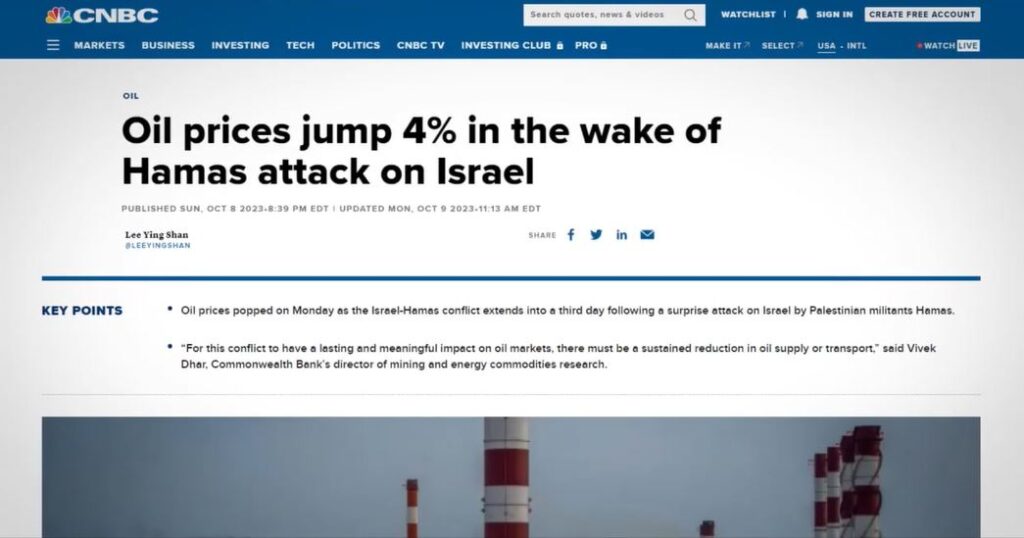Weekly Market Commentary
Oil Prices Jump After the Attack on Israel
Posted on October 9, 2023
Market Commentary by Mitchell Wood, Larson COO
| The 4th quarter opened with mixed results. The Nasdaq and the S&P 500 both managed to close positive, while the other three fell for the week. The mixed results were also seen at the sector level as Communication Services, Health Care, and Information Technology closed with gains while the other eight sectors dropped. Energy saw the biggest declines as the sector fell 5.39 percent. The drop was driven by the falling price per barrel of WTI Crude Futures. Crude Futures closed the week at $82.79 per barrel. This represents a roughly 8.5 percent drop from September’s high. |

Major Markets |
YTD as of 10/06/2023 | ||
| Nasdaq |  |
||
| Dow Jones Industrial |  |
||
| S&P 500 |  |
||
| MSCI World |  |
||
| MSCI EM |  |
||
| Russell 2000 |  |
||
| Bar US Agg Bnd |  |
||
 |
|||
S&P Sectors |
|
|||||
| Comm. Services |  |
|||||
| Cons. Discretionary |  |
|||||
| Cons. Staples |  |
|||||
| Energy |  |
|||||
| Financials |  |
|||||
| Health Care |  |
|||||
| Industrials |  |
|||||
| Info. Technology |  |
|||||
| Materials |  |
|||||
| Real Estate |  |
|||||
| Utilities |  |
|||||
 |
||||||
| Agent/Broker Dealer Use Only | ||||||
That said, over the weekend the attack on Israel flared up long-standing tensions in the region and sent prices up higher. While some market analysts said that prices could rise to as high as $150 per barrel, the initial shocks only sent prices back to the $90 range. Meanwhile, interest rates continued to flatten with the longer end of the yield curve rising significantly. The 30-year yield rose 22 basis points to end the week at 4.95 percent. |
This marks the highest level that this duration has been at in 26 years.
| The jump in interest rates was largely seen as the market repricing the favorable economic results that came in the form of Friday’s BLS Employment Report. The September headline reading saw the addition of 336,000 new jobs, effectively doubling the anticipated results of 170,000. This along with revisions to recent monthly results served as push back against the notion that the Fed would need to adjust the Fed Funds rate in the not too distant future due to declining economic results. This jump in rates hit the bond market and caused widespread losses. The Bloomberg Barclays Aggregate Bond Index fell over a percent last week and the index sits with a year-to-date loss over two and a quarter percent. https://www.cnbc.com/2023/10/09/brent-wti-prices-jump-after-hamas-attack-on-israel.html https://www.nytimes.com/2023/10/09/business/israel-gaza-oil-prices.html |
Time for a financial checkup?
Click “Schedule a Consult” and get in touch today.
| The S&P 500® Index is a capitalization index of 500 stock-designed to measure performance of the broad domestic economy through changes in the aggregate market value of stock representing all major industries. https://us.spindices.com/indices/equity/sp-500 The Dow Jones Industrial Average® (The Dow®), is a price-weighted measure of 30 U.S. blue-chip companies. The index covers all industries except transportation and utilities. https://us.spindices.com/indices/equity/dow-jones-industrial-average The NASDAQ Composite Index measures all NASDAQ domestic and international based common type stocks listed on The NASDAQ Stock Market. Today the NASDAQ Composite includes over 2,500 companies, more than most other stock market indexes. Because it is so broad-based, the Composite is one of the most widely followed and quoted major market indexes. https://indexes.nasdaqomx.com/Index/Overview/COMP The MSCI World Index, which is part of The Modern Index Strategy, is a broad global equity benchmark that represents large and mid-cap equity performance across 23 developed markets countries. It covers approximately 85% of the free float-adjusted market capitalization in each country and MSCI World benchmark does not offer exposure to emerging markets. The MSCI Emerging Markets (EM) Index is designed to represent the performance of large- and mid-cap securities in 24 Emerging Markets countries of the Americas, Europe, the Middle East, Africa and Asia. As of December 2017, it had more than 830 constituents and covered approximately 85% of the free float-adjusted market capitalization in each country. https://www.msci.com/ The S&P GSCI Crude Oil index provides investors with a reliable and publicly available benchmark for investment performance in the crude oil market. https://us.spindices.com/indices Companies in the S&P 500 Sector Indices are classified based on the Global Industry Classification Standard (GICS®). https://us.spindices.com/indices |






